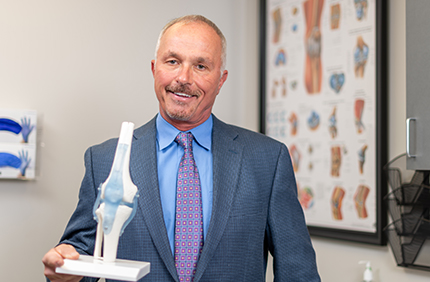Joint Replacement

Committed to Excellence in Orthopedics
Our renowned joint replacement specialists are dedicated to helping you feel your best! We have mastered the latest surgical techniques by performing nearly 2,000 joint replacements annually. We are proud to say that:
- More than 80% of our joint replacement patients go home the same day of surgery
- We offer innovative patient care, including a rapid recovery program for joint replacement patients
- We offer the latest robotic-assisted knee replacement technology
UM St. Joseph Medical Center brings the extraordinary expertise of Towson Orthopaedic Associates, which has served the Baltimore area for more than 90 years.
Nationally-recognized Orthopedic Care
UM St. Joseph Medical Center has been recognized as:
- "High Performing" in Hip Replacement & Knee Replacement by U.S. News & World Report for 2020-21
- One of "America's 100 Best Hospitals for Joint Replacement" by Healthgrades for 2021 & 2022
- One of "America's 100 Best Hospitals for Orthopedic Surgery" by Healthgrades for 2022
- A Blue Distinction Center+ for Knee and Hip Replacement by BlueCross BlueShield for providing quality care and patient results
Towson Orthopaedic Associates has been named:
- "Best Orthopedic Practice" — Baltimore Style Readers' Choice Awards 2020
- "Best in Orthopedics" — Best of Harford, Readers' Choice Awards 2021 & 2022
Patient Education
Our pre-operative Total Joint Class provides in-depth information to empower you and help you prepare for surgery. You and your family will learn what to expect during your surgery, hospital stay, and recuperation.
